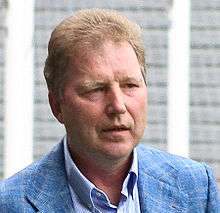Aleksandrs Starkovs
Aleksandrs Starkovs (born 26 July 1955) is a Latvian football coach and a former footballer. Most recently he coached FK Liepāja.
 | |||
| Personal information | |||
|---|---|---|---|
| Full name | Aleksandrs Starkovs | ||
| Date of birth | 26 July 1955 | ||
| Place of birth |
Madona, Latvian SSR, Soviet Union (now Republic of Latvia) | ||
| Playing position(s) | Striker | ||
| Senior career* | |||
| Years | Team | Apps | (Gls) |
| 1973–1975 | RPI Madona | ||
| 1975–1977 | FK Daugava Rīga | ||
| 1977–1978 | FC Dinamo Moscow | 0 | (0) |
| 1978–1989 | FK Daugava Rīga | 417 | (189) |
| Teams managed | |||
| 1990–1993 | FK Daugava Rīga (assistant) | ||
| 1992–1994 | Latvia U-21 | ||
| 1993–2004 | Skonto FC | ||
| 1995–2001 | Latvia (assistant) | ||
| 2001–2004 | Latvia | ||
| 2004–2006 | Spartak Moscow | ||
| 2006–2007 | Skonto FC (sporting director) | ||
| 2007–2013 | Latvia | ||
| 2010–2011 | Skonto FC | ||
| 2011–2012 | FC Baku | ||
| 2016–2017 | Latvia (assistant) | ||
| 2017–2018 | Latvia | ||
| 2019 | Liepāja | ||
| * Senior club appearances and goals counted for the domestic league only | |||
Starkovs has managed clubs such as Spartak Moscow in Russia, FK Baku in Azerbaijan and Skonto FC in Latvia as well as the Latvia national football team from 2001 to 2004 and from 2007 to July 2013. Since 2017 till 2018, he was the manager for the Latvia national football team.
Playing biography
Starkovs started playing football in Madona where he played for the local Olimpija Madona playing for which he was selected the best forward of the 1969 Latvia Leather ball tournament. In 1975 Starkovs joined FK Daugava Rīga. In 1978 Starkovs went to FC Dynamo Moscow but it wasn't the right team for him, so soon Starkovs was back in Riga. However his best years were still to come - in 1980s Starkovs was one of the best snipers of the Soviet first league, scoring over a hundred goals for Daugava.
In November 2003, to celebrate UEFA's Jubilee, he was selected as the Golden Player of Latvia by the Latvian Football Federation as their most outstanding player of the past 50 years.
Coaching career
As a team manager Starkovs made his name with Skonto FC which he brought to innumerable Latvian championships. He also worked with Latvia national under-21 football team and in 2001 he was appointed the general manager of Latvian national team. He took over the Latvian national team after its disastrous performance in 2002 FIFA World Cup qualifiers and lead the team to its biggest success ever, qualifying for Euro 2004 with a victory over World Cup bronze medalist Turkey.
After his success as the national team coach, he joined Spartak Moscow winning the silver medal of the Russian league in 2005, but in April 2006 he was forced to quit due to total obstruction from the team's fans and a conflict with former team captain Dmitri Alenichev.
Starkovs returned to Latvia in 2007 and took over the Latvian national team, which had been struggling under Jurijs Andrejevs.
In late 2009 Starkovs accepted the offer to manage Skonto FC and officially became the manager of the club in January 2010 as Paul Ashworth left. His return was explicitly successful as he managed to win the league. In January 2011 Starkovs left Skonto FC, signing a contract in Azerbaijan with FC Baku. Besides the work with the Azerbaijan Premier League club he still remained the manager of Latvia national football team.
Following series of unsuccessful matches Starkovs left his position on 15 July 2013, being replaced by the former Southampton F.C. star Marians Pahars.[1] Having been linked with potential moves to various clubs and national teams over time, Starkovs, though, has not taken office at any of them, stating he is "waiting for an interesting offer football-wise".[2] He is currently working at the Latvian Football Federation as the chairman of the National teams' committee. Starkovs also works as a coach for the Skonto Academy youth teams.
References
External links
- Aleksandrs Starkovs at Soccerway